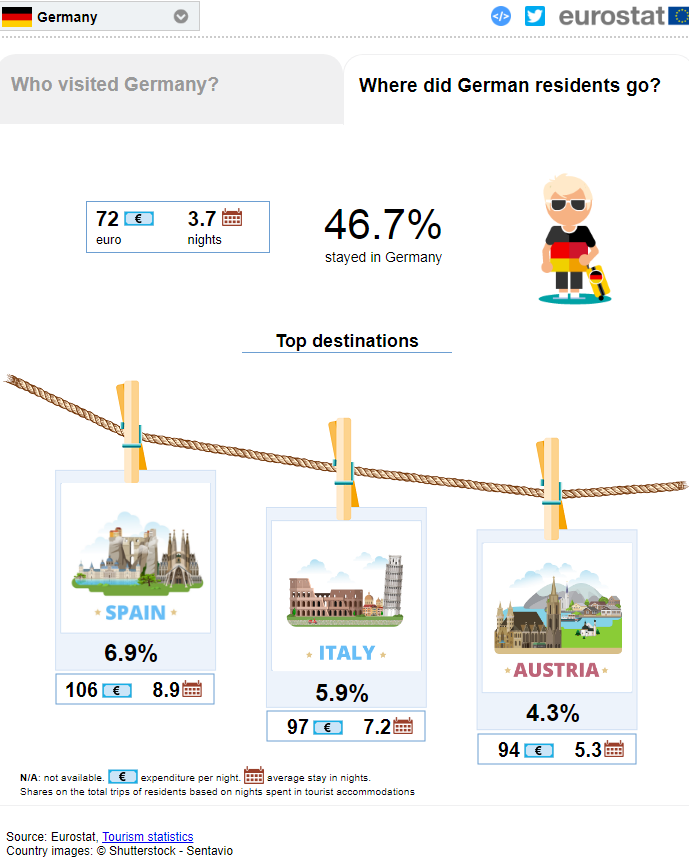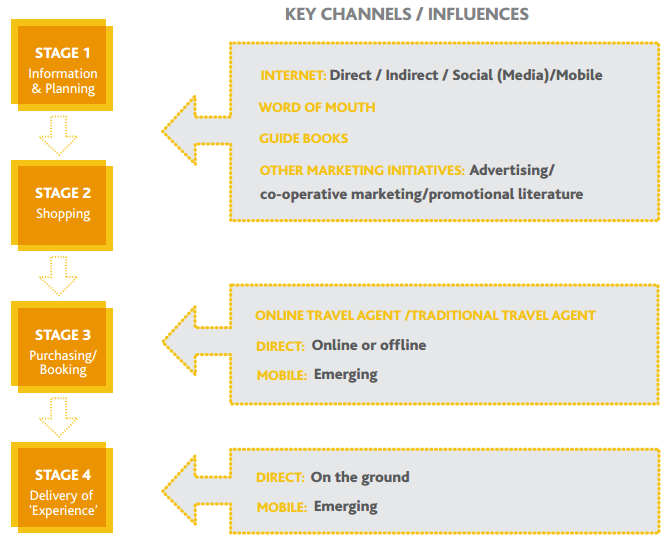This article is PART 1 of a block of articles called Tips & Tricks on Selling Your Hotel on the German Holiday Market aiming to demystify the process of getting your tourism product to the German customer. It is presented in an easy to read style to try to provide insight and clear up some confusions about the German outbound holiday market as well as advice on how to sell better. It is separated over three sections and presents an overview of:
– PART 1: The specifics of the German holiday travel market
– PART 2: Insight into the tour operators’ business
– PART 3: Strategies for success on the German outbound holiday market
The Specifics of the German Holiday Travel Market
Size and importance of the German outbound travel market
Being Europe’s largest economy, Germany is today competing with China and USA to be the world’s largest outbound travel market in terms of the number of trips (about 80 million travelers each year), according to World Travel Monitor® figures. Germany is the third largest outbound market for tourism spending last year (2016) with $81 billion spent on foreign trips, up five percent from 2015. Over half (53%) the German population take at least one holiday abroad each year. Holiday-taking is considered a right with high annual leave allowances (usually 30 days). 28.1 million people from the ABC1 social class take a holiday of 4+ nights. With 82% Internet penetration, travel and tourism products constitute around 50% of all online purchases in Germany.
Top 10 Markets For Outbound Tourist Spending in 2016
| Rank | Country | Spending ($U.S.) | % Growth Over 2015 |
|---|---|---|---|
| 1 | China | $221 billion | 12% |
| 2 | U.S. | $122 billion | 8% |
| 3 | Germany | $81 billion | 5% |
| 4 | UK | $64 billion | 10% |
| 5 | France | $41 billion | 7% |
| 6 | Canada | $29 billion | 0% |
| 7 | Korea | $27 billion | 8% |
| 8 | Australia | $27 billion | 8% |
| 9 | Italy | $25 billion | 1% |
| 10 | Hong Kong | $24 billion | 5% |
Source: UNWTO
When, where to and why do Germans travel?
Although Germans travel throughout the year, the main holiday season is still May to August, with 73.2% share. Specialised types of holidays are gaining in importance e.g. cruising and camping. Attractive scenery, things to see and do and friendly locals consistently hold the top three places in German people’s top ten reasons for choosing a holiday destination. Germans spend the largest proportion of their budget on bed and board.
The three largest outbound destinations for Germans are Spain, Italy and Austria.

The recent unrest and upheaval in Turkey, Egypt and Tunisia has particularly benefited the Canaries and Greece.
Trend: There is widespread belief that the current demand for shorter breaks, city breaks, event tourism, activity and adventure holidays, and culturally motivated trips is likely to gain popularity over the next five to ten years.
How Germans buy their holidays?
The role of travel agents and tour operators is still important in Germany with 47% of all German trips abroad (to all destinations) being organised by them.
While Germans were late adopters, the Internet is now the key tool for planning holidays. Guidebooks are still very popular in the German market. There are 4 key stages involved in the process from first deciding where to go on holiday through to experiencing it at the chosen destination:
TIP: It is important for you, you should buy copies of the popular guide books to see if you are listed or featured. You’ll be able to purchase them online as it is unlikely that your local book shop will stock them. If you are listed, then keep in touch with the editor / publisher if you have news on any product developments, new services you offer German visitors etc. If you’re not listed but you feel you have an interesting product that really appeals to German holidaymakers, then contact the editor / publisher to provide information for possible inclusion in the guide when they are next updating it. Also invite the editor or researcher to visit you when they are in your area doing research for their next edition.
The main tour operators in Germany (and EU)
The biggest tour operators active on the German market are TUI, Thomas Cook and Der Touristik – altogether holding more than 40% of the outbound tours. All these act as holding companies and have many travel brands.
| TOUR OPERATOR | SHARE OF GERMAN MARKET* |
| TUI | 16.90% |
| Thomas Cook | 13.20% |
| DER Touristik | 12.40% |
| FTI Group | 8.10% |
| Alltours | 5.60% |
| Alda Cruises | 5.00% |
| Schauinsland-Reisen | 3.70% |
| Small operators overall | 35% |
| * Based on 2013/2014 business year figures FVW.com estimate |
The tour operators’ holiday offerings are focused on higher margin holidays, both to their own-brand hotels and to a closely managed portfolio of selected partner hotels, which are differentiated by their focus on quality, their deep relationships with hotel partners, their in-destination support staff and, in some cases, full exclusivity.
This article is PART 1 of a block of articles called Tips & Tricks on Selling Your Hotel on the German Holiday Market aiming to demystify the process of getting your tourism product to the German customer. It is presented in an easy to read style to try to provide insight and clear up some confusions about the German outbound holiday market as well as advice on how to sell better. It is separated over three sections and presents an overview of:
– PART 1: The specifics of the German holiday travel market
– PART 2: Insight into the tour operators’ business
– PART 3: Strategies for success on the German outbound holiday market

